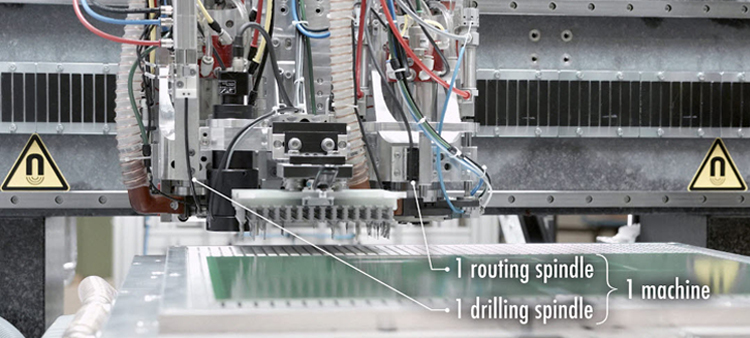Posalux Switzerland – Strategy and new markets
Even more precise PCB production possible; Posalux develops the drilling and milling process further to develop new markets.
The complex process of PCB production is subject to continuous change and further development. The circuit structures are continually refined, the PCBs as such are getting extremely thin at times, depending on application. There are qualified specialists for each step on the supply chain of PCBs. Posalux from Biel in Switzerland is one of them. Micro systems for high-precision production are the domain of this Swiss company. With its new ULTRASPEED MONO, it has achieved another step forward in precision for small series and prototype production.
For the manufacturers of PCBs, the purchase of new equipment is preceded by the decision on the type and specifically the dimensions of the new system. There are many operations that have focused on production of small series or even production of prototypes. This means, of course, that large machines that are designed for large series production are not an option. On the other hand, such operations often produce special designs or prototypes where special value must be placed on special requirements, maximum accuracy and quality. Nevertheless, acceptable cycle rates and good utilization in production must be warranted.
The manufacturers of large series also need more than just large machines. Not every series will also fully utilize the range of the system. Thus, it is sensible to integrate even smaller machines into production. Not least, it is, of course, also a cost factor whether investments are made in a badly utilized unit or a fully utilized smaller unit. Smaller units may also be used as buffers for times with high loads.
With the Ultraspeed Mono, the engineers at Posalux hit a market niche into which hardly any other machine fits so far. It can be used flexibly and integrates very well into present shop floors. The developers gave the small system the same machine equipment as can be found in large systems. For drilling and milling heads, the same equipment that may already be present can be used.
In terms of precision, however, further work was done. Where the drilling position tolerances when working with drilling and milling heads used to be at +-20 µm – no provider was able to offer smaller tolerances before – they could once again be reduced by 25 % to +-15 µm for the machine series. This feature is important, e.g. for free milling of copper inlays, to equip such inlays with connections or heat dissipaters. For copper layer thicknesses of only 30 µm in the inner layers, this development is a great step forward. The further-developed cutting technology is thus now able to further reduce surface roughness to achieve a very fine area free of adhesive residue – the polish function.
Milling is only one of the disciplines mastered to perfection by the Ultraspeed Mono. The drilling units have been improved as well. In addition to the even better precision, this sector also achieved a clear increase of productivity. Previous drilling units already managed an acceptable frequency of up to 1,000 strokes/minute. In the new drilling unit, the frequency could once again be increased by 20% to 1,200 strokes/minute.
Since two spindle sets are used in parallel in the Ultraspeed Mono, drilling and milling in the same run is possible to improve the tolerances even more. Any combination is possible – two drilling heads, a drilling head and a milling head, two milling heads. Equipment is specified in the logistics plans of the individual customer project. Control with the internal software permits easy specification of all parameters for production at the customer’s site. The software of the Posalux developers is deemed the standard reference in the industry.
It is possible to use the software control in combination with automatic panel supply systems to make the system work independently. After filling of the machine manual action is no longer required. For smaller operations, for example, this means that the machine can be set and equipped in the evening and left to run over night. This makes 24-hour utilizations of the machine easy – even in companies without shift operation. It is easily possible to implement direct product changes quickly. Even interruption of the current production to insert another product on short notice is possible easily.
Drilling and milling are processes where the material is removed mechanically. The spindles in the Ultraspeed Mono rotate at speeds between 5,000 and 300,000 rpm, depending on application. Such speeds do, of course, also generate vibrations. Therefore, the Ultraspeed Mono has been put on a ‚Granite Base‘. A stable granite block forms the foundation for the machine. The high material weight and great density of granite prevent most of the arising vibrations.
For ’normally thick‘ PCBs, the familiar clamp systems, with which the PCBs are clamped to the drilling table, can be used. For a higher throughput, layers of 3-5 PCBs are common. For some applications, however, such clamp systems cannot be used. The PCB is hold by the clamping device sidewise but may not be held stably in vertical position. Inaccuracies and rejects in production would be the consequence of this.
Posalux offers its customers a new development for such applications. The new option is to add a vacuum table to the Ultraspeed Mono. Switching between the clamp system and vacuum table is possible at any time depending on product line in production. The vacuum table takes up the PCBs fully and fastens them on the surface with a vacuum. A system of camera and software measures the precise position of the PCBs based on measuring points integrated in the printed layout and controls the spindle heads accordingly with maximum precision.
Last November, this new option drew lots of attention at ‚Productronica 2013‘. It offers a quality or value increase in a machine that has already been on the market for 2 years and that has only received the best of feedback from customers to date.
The Swiss manufacturer enters additional target markets with the Ultraspeed Mono as well: in addition to PCB production, the machine is also of interest for industries that work with flat materials, such as plates of aluminum, metal or glass. The machine can be used very well there. The first projects with new reference customers in these new industries are already underway. The company hopes to reach a wider market, as well as to achieve learning effects that in turn can benefit the main market of Posalux, the PCB industry, to come of this diversification.
The performance capacity of the new machine and specifically the possible positioning tolerance at +-15 µm, also make high-precision products of medical technology, including pacers and insulin pumps – in short: micro-sized and small flat parts – an accessible niche. With its precision, the new unit can also be used sensibly in production of adapter plates for electrical testers. Accuracy in such testers must be extremely high. Electrical connections and contacts are tested by finest needle systems in such devices.
The developers at Posalux continue on the path of their technology roadmap. The consequence with which they regularly implement their own specifications is impressive.





